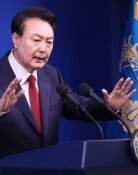How can a Cabinet-less gov`t proceed?
President Park Geun-hye chaired the first meeting of her senior secretaries on Wednesday since her inauguration. Noticeably absent was Kim Jang-soo, her nominee for National Security Office chief and No. 2 on her staff who serves as the central command of national security. Prime Minister Chung Hong-won assembled an emergency meeting of vice ministers and took care of state affairs Thursday. These situations were caused by failure to clear a bill on the government organization by the National Assembly despite the inauguration of the new government. Confirmation hearings for the heads of four ministries directly related to the organizational shakeup have not even been scheduled yet. It is difficult at this point even to predict when the new government can properly run all matters in administration.
President Park is responsible for this fiasco more than anyone else. She was behind schedule in proposing changes to the government structure and nominating Cabinet members. Things went from bad to worse due to the withdrawal of her first prime minister nominee with sloppy prescreening of his qualifications. The political circle should also be held accountable to a significant extent. The ruling and opposition parties need accelerated negotiations on matters of such grave concern, including the government reshuffle, to deliberate on them as early as possible. Even when negotiations stalled, the ruling and opposition parties remained stubborn and avoided dialogue for days.
The most contentious issue in the purported reshuffle of the government structure is the planned transfer of certain broadcast-related affairs from the Korea Communications Commission to the newly established Future Creation and Science Ministry. The government and the ruling party claim that for Korea to create a new economy through convergence of broadcasting and telecommunication, work related to the promotion of the broadcast industry should be handed over to the ministry. The main opposition Democratic United Party is denying the measure, claiming that such functions should remain with the commission, an institution designed to run based on compromise, to assure the public interest and broadcast fairness. Both sides have points in their arguments, but the debate is not grave enough to put the administration in a state of paralysis and rendering it unable to properly formulate its organization.
The two sides need to think in each other`s shoes. Is it impossible to converge broadcasting and communication barring the transfer of certain functions to the ministry, which the ruling Saenuri Party claimed? Or reversely, is it impossible to assure the public interest and broadcast fairness if the functions are transferred, as claimed by the Democratic United Party? The two sides can resolve problems that they are concerned about while gaining what they want by narrowing differences and reaching a compromise at a midway point. A basic requirement of negotiations is for both sides to seize the next best measure if they cannot afford to implement the best policy. If they continue to stubbornly insist on their positions and lock horns with each other, what will happen to the nation?
Februarys extraordinary session of the National Assembly will end Tuesday. Nobody knows how long it will take before parliament reopens. Considering the grave state of national security and the economy, a compromise should be reached at the earliest date possible. Coincidently, ruling party chief Hwang Woo-yea proposed a joint meeting of ruling and opposition party chiefs and National Assembly leaders Thursday, and the people will have no choice but to pin their final hopes. The two sides are urged to reach "a grand compromise" without fail before the extraordinary session ends. President Park should also devise ways to resolve the impasse from a grandiose perspective rather than simply leaving the situation to bipartisan negotiations.






